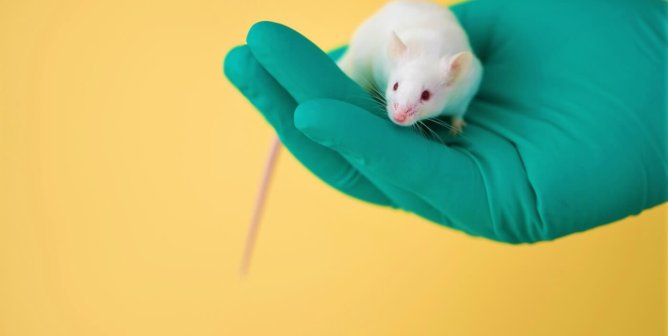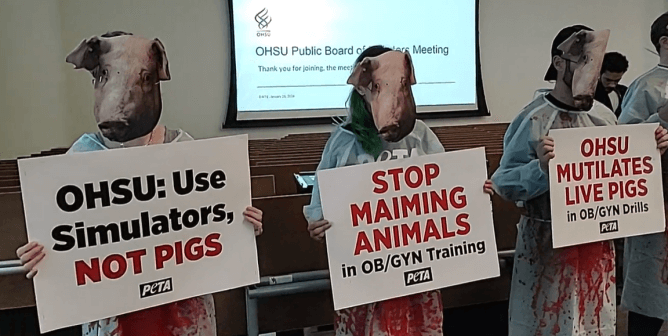Their Names Were Jelly and Peony
Update (November 4, 2022): VICTORY! Texas A&M University has confirmed that it will release the nine healthy golden retrievers it had transferred from its failed canine muscular dystrophy laboratory to the veterinary school!
This momentous news comes after PETA’s hard-fought campaign that began with our shocking exposé of the school’s deplorable laboratory. Our relentless pressure ended its cruel breeding of dogs to develop this crippling disease and led to the release of more than 50 dogs.
But we never gave up on these nine betrayed golden retrievers. We campaigned hard—and now the dogs will be in homes before the end of the year.
You can read more about our win for the nine dogs here.
Originally posted on April 5, 2017:
Jelly’s Suffering
A golden retriever known as Jelly was bred to develop golden retriever muscular dystrophy (GRMD), a disease that is so debilitating that afflicted puppies become severely crippled and may endure agonizing deaths at a young age. She suffered through Joe Kornegay’s cruel experiments at Texas A&M University (TAMU) starting when she was a puppy. Throughout her miserable life, she was subjected to repeated painful muscle biopsies taken from both hind limbs. She would have undergone anesthesia multiple times for those and other invasive procedures—a frightening experience for any dog.
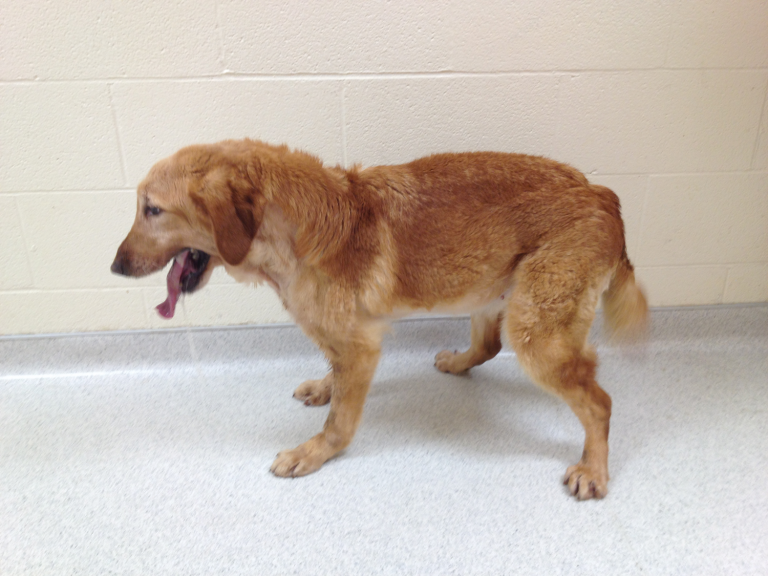
Jelly was never able to run and play like a normal puppy. Early on, she likely experienced stunted growth because of an inability to suckle properly. By about 6 weeks of age, she would have developed spasms in the jaw muscles, preventing her from opening her mouth fully.
She also suffered from degeneration and wasting of her leg muscles, which, in turn, caused an abnormal stance that forced her to walk with a stilted, unnatural gait. Over time, her spine curved excessively inward. Her enlarged tongue muscles caused difficulty breathing, swallowing, and eating. Excessive drooling made it impossible for her to keep herself clean. She may also have experienced respiratory problems from an enlarged diaphragm.
Jelly spent her whole life caged in barren laboratories. Her only time outdoors was apparently during the move from the laboratory at the University of North Carolina (UNC)–Chapel Hill, where she was born in 2007 and assigned the number 160677, to TAMU—where she lived caged and alone.
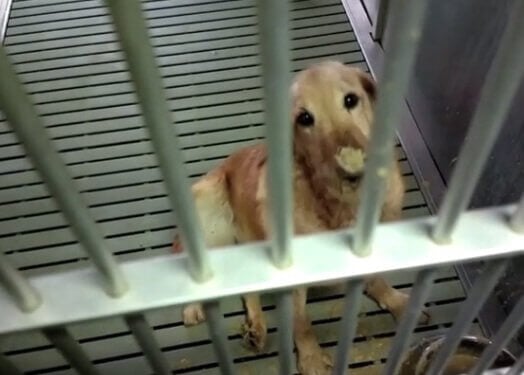
She not only endured the extremely debilitating symptoms of GRMD but also was subjected to painful experiments on a regular basis. Records indicate that she was euthanized at the age of 8, likely so that her tissues could be harvested and studied. These experiments led to a lifetime of suffering for her and many other dogs and have failed to produce a cure or effective treatment to reverse the symptoms of muscular dystrophy in humans.
Peony: A Short Life of Misery

Peony was a female golden retriever who was also bred to have GRMD. Born on May 19, 2011, in a laboratory at UNC–Chapel Hill, she had a medium-blond coat and a white teardrop marking between her eyes.
Because of the poor conditions that she was kept in, GRMD wasn’t the only illness that Peony had to contend with. As a puppy, she suffered from bouts of intestinal parasites that caused vomiting, nausea, an uncomfortably bloated abdomen, and painful, often bloody diarrhea. At just 2 months of age, she was diagnosed with coccidiosis, which is caused by a parasite that’s spread through contaminated fecal matter. It is often found in puppy mills and is associated with poor sanitation and severe crowding. This suggests that UNC–Chapel Hill kept her in squalid and crowded living conditions. Only three months after this diagnosis, she tested positive for giardiasis, caused by another parasite that’s associated with severe crowding, stressful conditions, and an unclean environment. The symptoms of this illness were similar to that of her last infection, including diarrhea, vomiting, weight loss, and decreased energy. She likely became infected with this parasite when she drank water contaminated with the feces of infected dogs. It seems that the university couldn’t manage to give the dogs the adequate housing mandated by law.
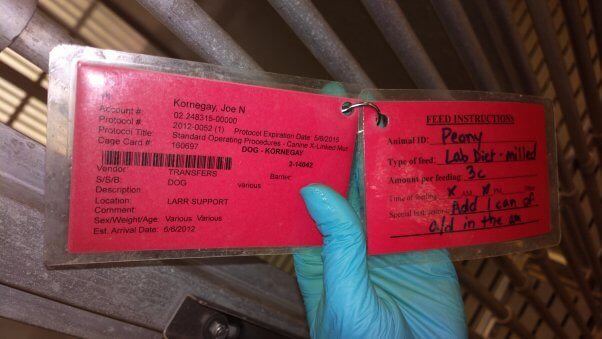
Peony was subjected to painful surgeries so that experimenters could obtain muscle biopsies. One of her incisions became infected, swelling painfully and oozing thick yellow pus. She was already underweight, and her growth was stunted because of the GRMD, but her body condition worsened with the infection and repeated experimentation.
In 2012, she was transferred to TAMU, where—in addition to suffering from lethargy, drooling, and diarrhea—she often refused to eat, likely because of her worsening condition. By the time she was 21 months old, she was emaciated, weighing just under 30 pounds. The average weight for healthy female golden retrievers this age is 55 to 70 pounds.
Peony’s enlarged tongue, caused by the GRMD, made her salivate uncontrollably. That, in turn, made it difficult for her to swallow, breathe, and eat. She regularly had excessive saliva hanging in long strings of 8 inches or more from her mouth, which was noted as normal by experimenters. The drool soaked the fur on her chest and caused a moist skin infection and hair loss. She often accumulated foamy saliva in and around her mouth, which she desperately tried to swallow, ultimately coughing it back up.
Can you imagine how miserable every moment of her life must have been?
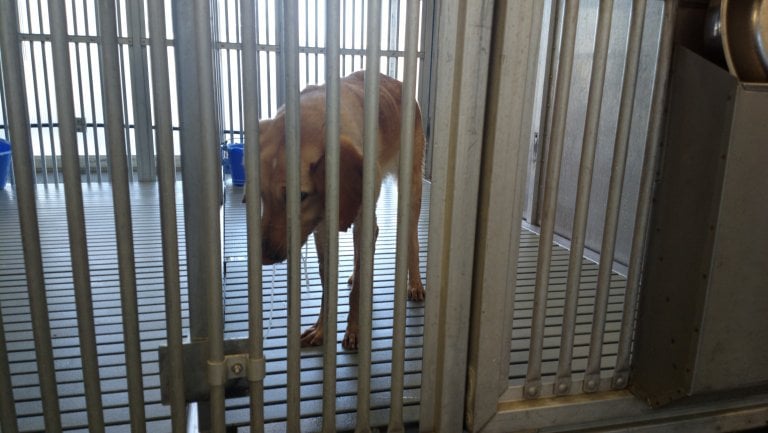
Peony and the other dogs imprisoned at TAMU couldn’t even escape their misery when being bathed. Employees claimed that there was no way to adjust the water temperature, so the dogs were hosed down with cold water. Because Peony had little fat on her body, she would have had difficulty regulating her body temperature to keep warm, making a cold bath torture for her.
In early November 2012, experimenters discovered her lying on her side and unwilling to get up. She was crying out and salivating more than usual. She got up after being coaxed during an examination, but she was only able to walk around for about one minute, before returning to lie down. At this point, Joe Kornegay, the lead experimenter, suggested that she could be experiencing heart problems, which GRMD can also cause. But she appears to have received no further testing or treatment to address her lethargy and collapse.
Sadly, Peony spent much of her time suffering in her cage—without even a blanket for bedding—before she was euthanized on March 5, 2013, two months shy of her second birthday.
What You Can Do
Please urge TAMU to close its dog laboratory, release all dogs for adoption into good homes, and redirect resources toward humane research methods.

